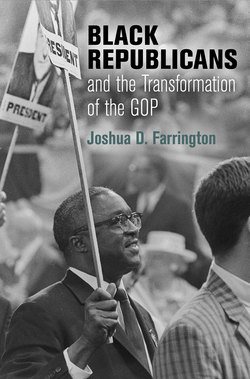Black Republicans and the Transformation of the GOP

Реклама. ООО «ЛитРес», ИНН: 7719571260.
Оглавление
Joshua D. Farrington. Black Republicans and the Transformation of the GOP
Отрывок из книги
Black Republicans and the Transformation of the GOP
Series Editors:
.....
On the campaign trail, Republicans spent twice as much as Democrats in their efforts to woo black voters. Younger, more assertive African Americans like Francis E. Rivers were assigned prominent roles in the campaign. Light complexioned with blue eyes, Rivers had degrees from Yale and Columbia Law School, and was described by a peer as carrying himself “as one might imagine British nobility would.” His daily lunch routine included ordering a “martini, made with Tanqueray gin, up, with a twist.” Though distinctly upper crust, Rivers saw himself as a “New Negro,” no longer drawn to Abraham Lincoln, and in the early 1930s, Harlem voters elected him to the New York State Assembly on the basis of his unequivocal advocacy for civil rights. In 1936, Rivers was named director of the RNC’s Colored Voters Division’s eastern campaign, where he produced pro-Landon films featured in black theaters and sponsored a thirty-city tour of Jesse Owens, fresh from spectacular victories at the Berlin Olympics.30
The biggest hurdle Rivers faced among African Americans was his party’s failure to offer a meaningful alternative to New Deal relief. Without their own program to sell, black Republicans focused on highlighting discrimination within Roosevelt’s agencies. A well distributed statement signed by Rivers and sixty-five other black Republican leaders, including Roscoe Conkling Simmons, Oscar DePriest, Robert Church, and Perry Howard, provided a laundry list of examples of inequality within the New Deal, hoping that disgust over discrimination would outweigh support of its benefits. Some black Republicans also challenged the New Deal on ideological grounds. Rivers warned that Democrats sought to reduce the African American to “‘an unemployable,’ whom it will treat like the American Indian was treated, and confine the colored man on modern reservations of relief.” Perry Howard proclaimed, “Capital is in the Republican Party. The Democratic Party is the poor man’s party,” a sentiment that served Democrats more than it did his own party.31
.....